Exploring Talent Management Strategies for Organizational Success
VerifiedAdded on 2023/01/04
|6
|2727
|34
Report
AI Summary
This report explores effective talent management strategies that contribute to organizational success, emphasizing the roles of leadership in employee development and the impact of recruitment and selection strategies. It examines the benefits of talent management, particularly for companies like Arcadia Group retailer, and recommends strategies for managing and developing talent within an organization. The research uses a qualitative approach, employing interpretivism research philosophy and inductive research approach with both primary and secondary data collection methods. The study also addresses ethical considerations, ensuring privacy, confidentiality, and legal compliance. The expected outcomes highlight the importance of talent management in achieving organizational goals, improving company image, and increasing staff retention through training and rewards.
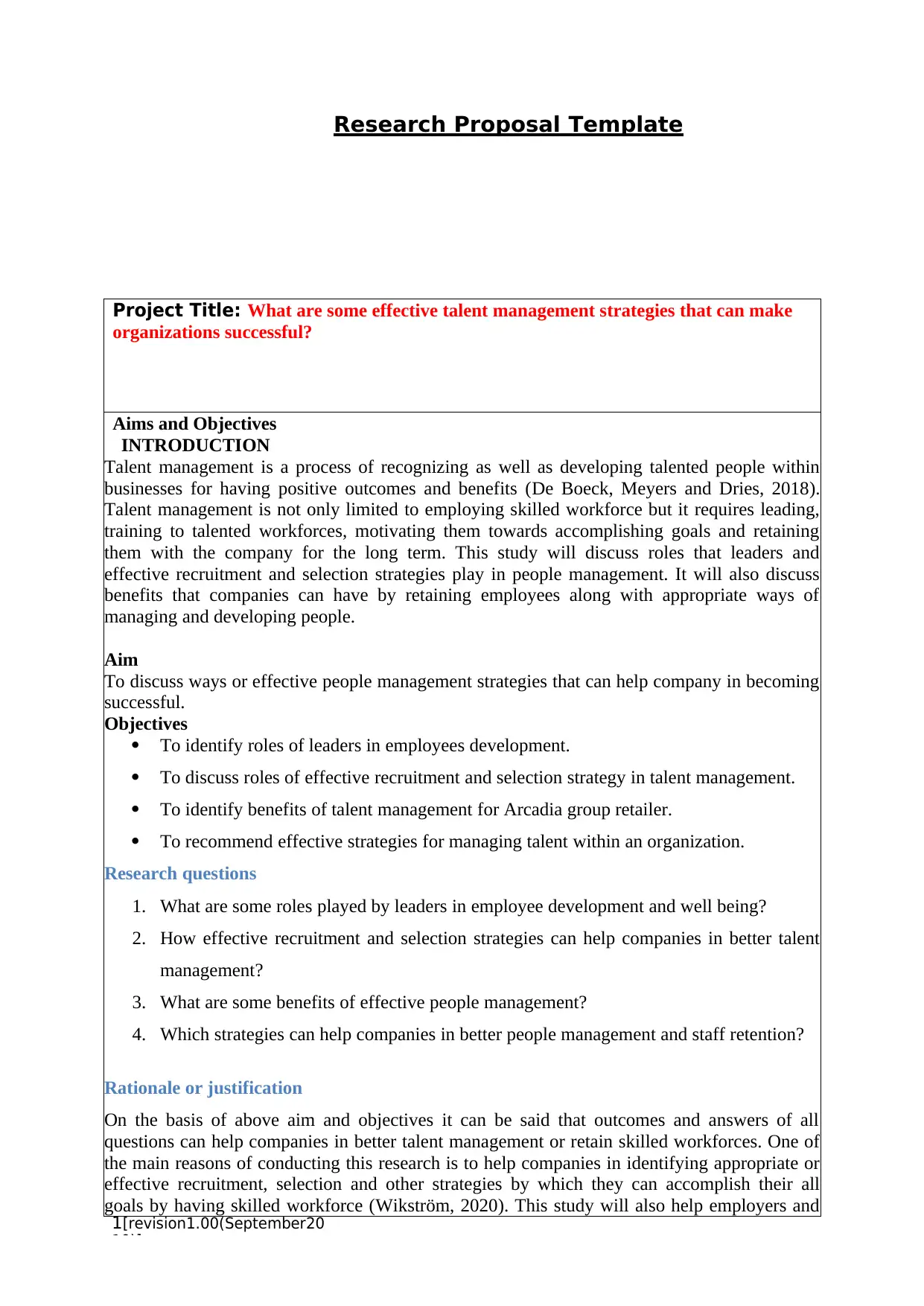
1 [revision1.00(September20
10)]
Research Proposal Template
Project Title: What are some effective talent management strategies that can make
organizations successful?
Aims and Objectives
INTRODUCTION
Talent management is a process of recognizing as well as developing talented people within
businesses for having positive outcomes and benefits (De Boeck, Meyers and Dries, 2018).
Talent management is not only limited to employing skilled workforce but it requires leading,
training to talented workforces, motivating them towards accomplishing goals and retaining
them with the company for the long term. This study will discuss roles that leaders and
effective recruitment and selection strategies play in people management. It will also discuss
benefits that companies can have by retaining employees along with appropriate ways of
managing and developing people.
Aim
To discuss ways or effective people management strategies that can help company in becoming
successful.
Objectives
To identify roles of leaders in employees development.
To discuss roles of effective recruitment and selection strategy in talent management.
To identify benefits of talent management for Arcadia group retailer.
To recommend effective strategies for managing talent within an organization.
Research questions
1. What are some roles played by leaders in employee development and well being?
2. How effective recruitment and selection strategies can help companies in better talent
management?
3. What are some benefits of effective people management?
4. Which strategies can help companies in better people management and staff retention?
Rationale or justification
On the basis of above aim and objectives it can be said that outcomes and answers of all
questions can help companies in better talent management or retain skilled workforces. One of
the main reasons of conducting this research is to help companies in identifying appropriate or
effective recruitment, selection and other strategies by which they can accomplish their all
goals by having skilled workforce (Wikström, 2020). This study will also help employers and
10)]
Research Proposal Template
Project Title: What are some effective talent management strategies that can make
organizations successful?
Aims and Objectives
INTRODUCTION
Talent management is a process of recognizing as well as developing talented people within
businesses for having positive outcomes and benefits (De Boeck, Meyers and Dries, 2018).
Talent management is not only limited to employing skilled workforce but it requires leading,
training to talented workforces, motivating them towards accomplishing goals and retaining
them with the company for the long term. This study will discuss roles that leaders and
effective recruitment and selection strategies play in people management. It will also discuss
benefits that companies can have by retaining employees along with appropriate ways of
managing and developing people.
Aim
To discuss ways or effective people management strategies that can help company in becoming
successful.
Objectives
To identify roles of leaders in employees development.
To discuss roles of effective recruitment and selection strategy in talent management.
To identify benefits of talent management for Arcadia group retailer.
To recommend effective strategies for managing talent within an organization.
Research questions
1. What are some roles played by leaders in employee development and well being?
2. How effective recruitment and selection strategies can help companies in better talent
management?
3. What are some benefits of effective people management?
4. Which strategies can help companies in better people management and staff retention?
Rationale or justification
On the basis of above aim and objectives it can be said that outcomes and answers of all
questions can help companies in better talent management or retain skilled workforces. One of
the main reasons of conducting this research is to help companies in identifying appropriate or
effective recruitment, selection and other strategies by which they can accomplish their all
goals by having skilled workforce (Wikström, 2020). This study will also help employers and
Paraphrase This Document
Need a fresh take? Get an instant paraphrase of this document with our AI Paraphraser
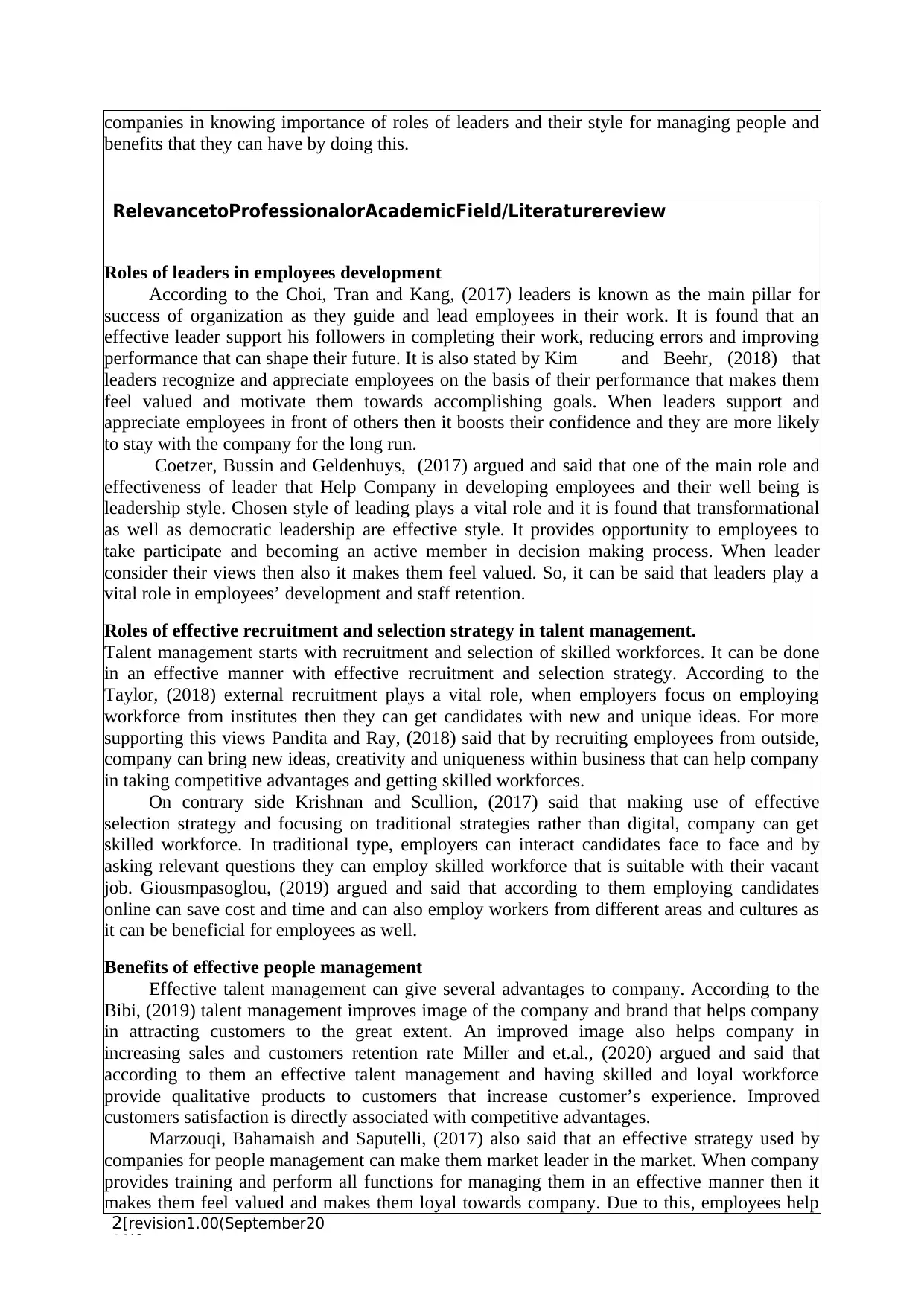
2 [revision1.00(September20
10)]
companies in knowing importance of roles of leaders and their style for managing people and
benefits that they can have by doing this.
RelevancetoProfessionalorAcademicField/Literaturereview
Roles of leaders in employees development
According to the Choi, Tran and Kang, (2017) leaders is known as the main pillar for
success of organization as they guide and lead employees in their work. It is found that an
effective leader support his followers in completing their work, reducing errors and improving
performance that can shape their future. It is also stated by Kim and Beehr, (2018) that
leaders recognize and appreciate employees on the basis of their performance that makes them
feel valued and motivate them towards accomplishing goals. When leaders support and
appreciate employees in front of others then it boosts their confidence and they are more likely
to stay with the company for the long run.
Coetzer, Bussin and Geldenhuys, (2017) argued and said that one of the main role and
effectiveness of leader that Help Company in developing employees and their well being is
leadership style. Chosen style of leading plays a vital role and it is found that transformational
as well as democratic leadership are effective style. It provides opportunity to employees to
take participate and becoming an active member in decision making process. When leader
consider their views then also it makes them feel valued. So, it can be said that leaders play a
vital role in employees’ development and staff retention.
Roles of effective recruitment and selection strategy in talent management.
Talent management starts with recruitment and selection of skilled workforces. It can be done
in an effective manner with effective recruitment and selection strategy. According to the
Taylor, (2018) external recruitment plays a vital role, when employers focus on employing
workforce from institutes then they can get candidates with new and unique ideas. For more
supporting this views Pandita and Ray, (2018) said that by recruiting employees from outside,
company can bring new ideas, creativity and uniqueness within business that can help company
in taking competitive advantages and getting skilled workforces.
On contrary side Krishnan and Scullion, (2017) said that making use of effective
selection strategy and focusing on traditional strategies rather than digital, company can get
skilled workforce. In traditional type, employers can interact candidates face to face and by
asking relevant questions they can employ skilled workforce that is suitable with their vacant
job. Giousmpasoglou, (2019) argued and said that according to them employing candidates
online can save cost and time and can also employ workers from different areas and cultures as
it can be beneficial for employees as well.
Benefits of effective people management
Effective talent management can give several advantages to company. According to the
Bibi, (2019) talent management improves image of the company and brand that helps company
in attracting customers to the great extent. An improved image also helps company in
increasing sales and customers retention rate Miller and et.al., (2020) argued and said that
according to them an effective talent management and having skilled and loyal workforce
provide qualitative products to customers that increase customer’s experience. Improved
customers satisfaction is directly associated with competitive advantages.
Marzouqi, Bahamaish and Saputelli, (2017) also said that an effective strategy used by
companies for people management can make them market leader in the market. When company
provides training and perform all functions for managing them in an effective manner then it
makes them feel valued and makes them loyal towards company. Due to this, employees help
10)]
companies in knowing importance of roles of leaders and their style for managing people and
benefits that they can have by doing this.
RelevancetoProfessionalorAcademicField/Literaturereview
Roles of leaders in employees development
According to the Choi, Tran and Kang, (2017) leaders is known as the main pillar for
success of organization as they guide and lead employees in their work. It is found that an
effective leader support his followers in completing their work, reducing errors and improving
performance that can shape their future. It is also stated by Kim and Beehr, (2018) that
leaders recognize and appreciate employees on the basis of their performance that makes them
feel valued and motivate them towards accomplishing goals. When leaders support and
appreciate employees in front of others then it boosts their confidence and they are more likely
to stay with the company for the long run.
Coetzer, Bussin and Geldenhuys, (2017) argued and said that one of the main role and
effectiveness of leader that Help Company in developing employees and their well being is
leadership style. Chosen style of leading plays a vital role and it is found that transformational
as well as democratic leadership are effective style. It provides opportunity to employees to
take participate and becoming an active member in decision making process. When leader
consider their views then also it makes them feel valued. So, it can be said that leaders play a
vital role in employees’ development and staff retention.
Roles of effective recruitment and selection strategy in talent management.
Talent management starts with recruitment and selection of skilled workforces. It can be done
in an effective manner with effective recruitment and selection strategy. According to the
Taylor, (2018) external recruitment plays a vital role, when employers focus on employing
workforce from institutes then they can get candidates with new and unique ideas. For more
supporting this views Pandita and Ray, (2018) said that by recruiting employees from outside,
company can bring new ideas, creativity and uniqueness within business that can help company
in taking competitive advantages and getting skilled workforces.
On contrary side Krishnan and Scullion, (2017) said that making use of effective
selection strategy and focusing on traditional strategies rather than digital, company can get
skilled workforce. In traditional type, employers can interact candidates face to face and by
asking relevant questions they can employ skilled workforce that is suitable with their vacant
job. Giousmpasoglou, (2019) argued and said that according to them employing candidates
online can save cost and time and can also employ workers from different areas and cultures as
it can be beneficial for employees as well.
Benefits of effective people management
Effective talent management can give several advantages to company. According to the
Bibi, (2019) talent management improves image of the company and brand that helps company
in attracting customers to the great extent. An improved image also helps company in
increasing sales and customers retention rate Miller and et.al., (2020) argued and said that
according to them an effective talent management and having skilled and loyal workforce
provide qualitative products to customers that increase customer’s experience. Improved
customers satisfaction is directly associated with competitive advantages.
Marzouqi, Bahamaish and Saputelli, (2017) also said that an effective strategy used by
companies for people management can make them market leader in the market. When company
provides training and perform all functions for managing them in an effective manner then it
makes them feel valued and makes them loyal towards company. Due to this, employees help
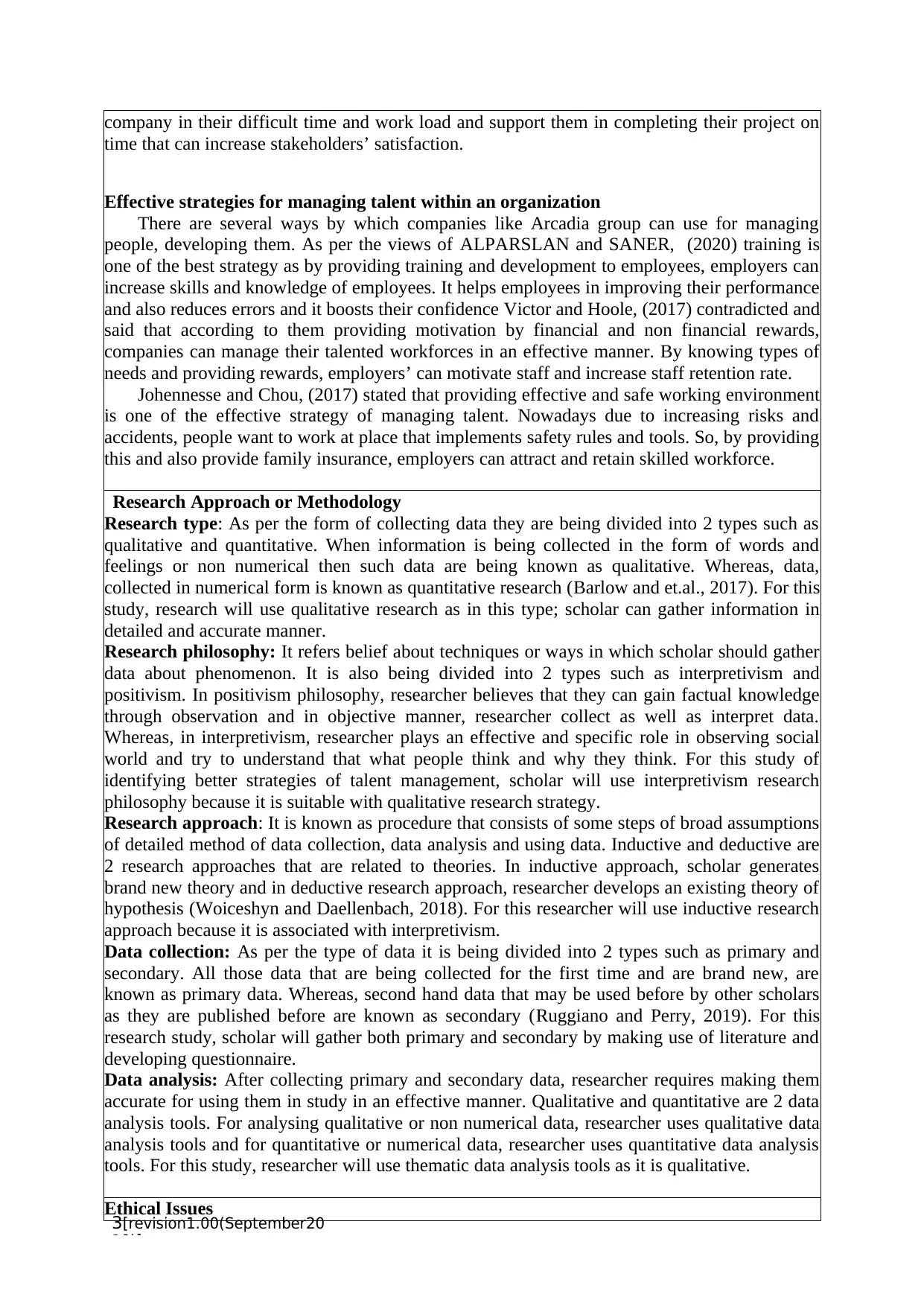
3 [revision1.00(September20
10)]
company in their difficult time and work load and support them in completing their project on
time that can increase stakeholders’ satisfaction.
Effective strategies for managing talent within an organization
There are several ways by which companies like Arcadia group can use for managing
people, developing them. As per the views of ALPARSLAN and SANER, (2020) training is
one of the best strategy as by providing training and development to employees, employers can
increase skills and knowledge of employees. It helps employees in improving their performance
and also reduces errors and it boosts their confidence Victor and Hoole, (2017) contradicted and
said that according to them providing motivation by financial and non financial rewards,
companies can manage their talented workforces in an effective manner. By knowing types of
needs and providing rewards, employers’ can motivate staff and increase staff retention rate.
Johennesse and Chou, (2017) stated that providing effective and safe working environment
is one of the effective strategy of managing talent. Nowadays due to increasing risks and
accidents, people want to work at place that implements safety rules and tools. So, by providing
this and also provide family insurance, employers can attract and retain skilled workforce.
Research Approach or Methodology
Research type: As per the form of collecting data they are being divided into 2 types such as
qualitative and quantitative. When information is being collected in the form of words and
feelings or non numerical then such data are being known as qualitative. Whereas, data,
collected in numerical form is known as quantitative research (Barlow and et.al., 2017). For this
study, research will use qualitative research as in this type; scholar can gather information in
detailed and accurate manner.
Research philosophy: It refers belief about techniques or ways in which scholar should gather
data about phenomenon. It is also being divided into 2 types such as interpretivism and
positivism. In positivism philosophy, researcher believes that they can gain factual knowledge
through observation and in objective manner, researcher collect as well as interpret data.
Whereas, in interpretivism, researcher plays an effective and specific role in observing social
world and try to understand that what people think and why they think. For this study of
identifying better strategies of talent management, scholar will use interpretivism research
philosophy because it is suitable with qualitative research strategy.
Research approach: It is known as procedure that consists of some steps of broad assumptions
of detailed method of data collection, data analysis and using data. Inductive and deductive are
2 research approaches that are related to theories. In inductive approach, scholar generates
brand new theory and in deductive research approach, researcher develops an existing theory of
hypothesis (Woiceshyn and Daellenbach, 2018). For this researcher will use inductive research
approach because it is associated with interpretivism.
Data collection: As per the type of data it is being divided into 2 types such as primary and
secondary. All those data that are being collected for the first time and are brand new, are
known as primary data. Whereas, second hand data that may be used before by other scholars
as they are published before are known as secondary (Ruggiano and Perry, 2019). For this
research study, scholar will gather both primary and secondary by making use of literature and
developing questionnaire.
Data analysis: After collecting primary and secondary data, researcher requires making them
accurate for using them in study in an effective manner. Qualitative and quantitative are 2 data
analysis tools. For analysing qualitative or non numerical data, researcher uses qualitative data
analysis tools and for quantitative or numerical data, researcher uses quantitative data analysis
tools. For this study, researcher will use thematic data analysis tools as it is qualitative.
Ethical Issues
10)]
company in their difficult time and work load and support them in completing their project on
time that can increase stakeholders’ satisfaction.
Effective strategies for managing talent within an organization
There are several ways by which companies like Arcadia group can use for managing
people, developing them. As per the views of ALPARSLAN and SANER, (2020) training is
one of the best strategy as by providing training and development to employees, employers can
increase skills and knowledge of employees. It helps employees in improving their performance
and also reduces errors and it boosts their confidence Victor and Hoole, (2017) contradicted and
said that according to them providing motivation by financial and non financial rewards,
companies can manage their talented workforces in an effective manner. By knowing types of
needs and providing rewards, employers’ can motivate staff and increase staff retention rate.
Johennesse and Chou, (2017) stated that providing effective and safe working environment
is one of the effective strategy of managing talent. Nowadays due to increasing risks and
accidents, people want to work at place that implements safety rules and tools. So, by providing
this and also provide family insurance, employers can attract and retain skilled workforce.
Research Approach or Methodology
Research type: As per the form of collecting data they are being divided into 2 types such as
qualitative and quantitative. When information is being collected in the form of words and
feelings or non numerical then such data are being known as qualitative. Whereas, data,
collected in numerical form is known as quantitative research (Barlow and et.al., 2017). For this
study, research will use qualitative research as in this type; scholar can gather information in
detailed and accurate manner.
Research philosophy: It refers belief about techniques or ways in which scholar should gather
data about phenomenon. It is also being divided into 2 types such as interpretivism and
positivism. In positivism philosophy, researcher believes that they can gain factual knowledge
through observation and in objective manner, researcher collect as well as interpret data.
Whereas, in interpretivism, researcher plays an effective and specific role in observing social
world and try to understand that what people think and why they think. For this study of
identifying better strategies of talent management, scholar will use interpretivism research
philosophy because it is suitable with qualitative research strategy.
Research approach: It is known as procedure that consists of some steps of broad assumptions
of detailed method of data collection, data analysis and using data. Inductive and deductive are
2 research approaches that are related to theories. In inductive approach, scholar generates
brand new theory and in deductive research approach, researcher develops an existing theory of
hypothesis (Woiceshyn and Daellenbach, 2018). For this researcher will use inductive research
approach because it is associated with interpretivism.
Data collection: As per the type of data it is being divided into 2 types such as primary and
secondary. All those data that are being collected for the first time and are brand new, are
known as primary data. Whereas, second hand data that may be used before by other scholars
as they are published before are known as secondary (Ruggiano and Perry, 2019). For this
research study, scholar will gather both primary and secondary by making use of literature and
developing questionnaire.
Data analysis: After collecting primary and secondary data, researcher requires making them
accurate for using them in study in an effective manner. Qualitative and quantitative are 2 data
analysis tools. For analysing qualitative or non numerical data, researcher uses qualitative data
analysis tools and for quantitative or numerical data, researcher uses quantitative data analysis
tools. For this study, researcher will use thematic data analysis tools as it is qualitative.
Ethical Issues
⊘ This is a preview!⊘
Do you want full access?
Subscribe today to unlock all pages.

Trusted by 1+ million students worldwide
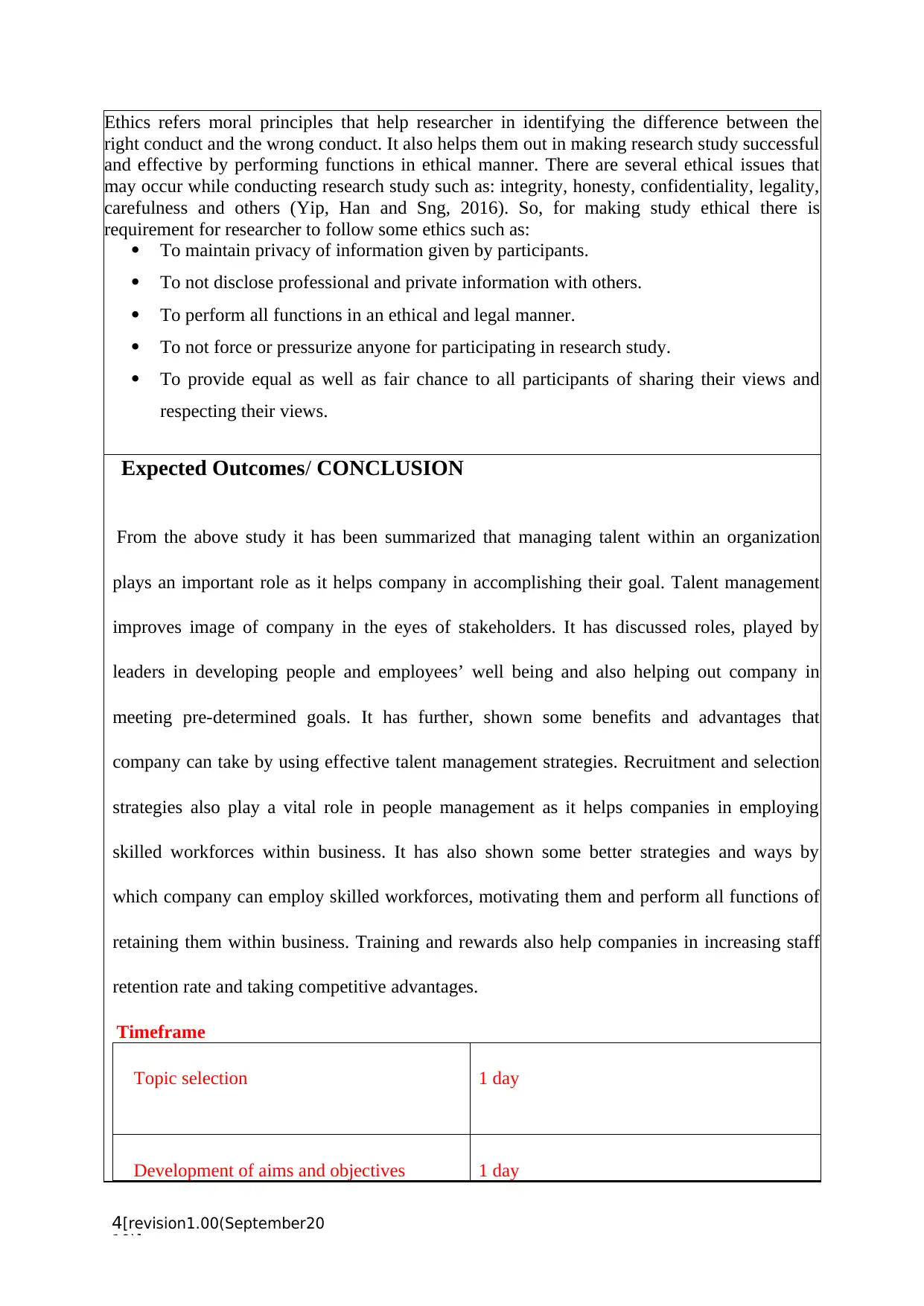
4 [revision1.00(September20
10)]
Ethics refers moral principles that help researcher in identifying the difference between the
right conduct and the wrong conduct. It also helps them out in making research study successful
and effective by performing functions in ethical manner. There are several ethical issues that
may occur while conducting research study such as: integrity, honesty, confidentiality, legality,
carefulness and others (Yip, Han and Sng, 2016). So, for making study ethical there is
requirement for researcher to follow some ethics such as:
To maintain privacy of information given by participants.
To not disclose professional and private information with others.
To perform all functions in an ethical and legal manner.
To not force or pressurize anyone for participating in research study.
To provide equal as well as fair chance to all participants of sharing their views and
respecting their views.
Expected Outcomes/ CONCLUSION
From the above study it has been summarized that managing talent within an organization
plays an important role as it helps company in accomplishing their goal. Talent management
improves image of company in the eyes of stakeholders. It has discussed roles, played by
leaders in developing people and employees’ well being and also helping out company in
meeting pre-determined goals. It has further, shown some benefits and advantages that
company can take by using effective talent management strategies. Recruitment and selection
strategies also play a vital role in people management as it helps companies in employing
skilled workforces within business. It has also shown some better strategies and ways by
which company can employ skilled workforces, motivating them and perform all functions of
retaining them within business. Training and rewards also help companies in increasing staff
retention rate and taking competitive advantages.
Timeframe
Topic selection 1 day
Development of aims and objectives 1 day
10)]
Ethics refers moral principles that help researcher in identifying the difference between the
right conduct and the wrong conduct. It also helps them out in making research study successful
and effective by performing functions in ethical manner. There are several ethical issues that
may occur while conducting research study such as: integrity, honesty, confidentiality, legality,
carefulness and others (Yip, Han and Sng, 2016). So, for making study ethical there is
requirement for researcher to follow some ethics such as:
To maintain privacy of information given by participants.
To not disclose professional and private information with others.
To perform all functions in an ethical and legal manner.
To not force or pressurize anyone for participating in research study.
To provide equal as well as fair chance to all participants of sharing their views and
respecting their views.
Expected Outcomes/ CONCLUSION
From the above study it has been summarized that managing talent within an organization
plays an important role as it helps company in accomplishing their goal. Talent management
improves image of company in the eyes of stakeholders. It has discussed roles, played by
leaders in developing people and employees’ well being and also helping out company in
meeting pre-determined goals. It has further, shown some benefits and advantages that
company can take by using effective talent management strategies. Recruitment and selection
strategies also play a vital role in people management as it helps companies in employing
skilled workforces within business. It has also shown some better strategies and ways by
which company can employ skilled workforces, motivating them and perform all functions of
retaining them within business. Training and rewards also help companies in increasing staff
retention rate and taking competitive advantages.
Timeframe
Topic selection 1 day
Development of aims and objectives 1 day
Paraphrase This Document
Need a fresh take? Get an instant paraphrase of this document with our AI Paraphraser
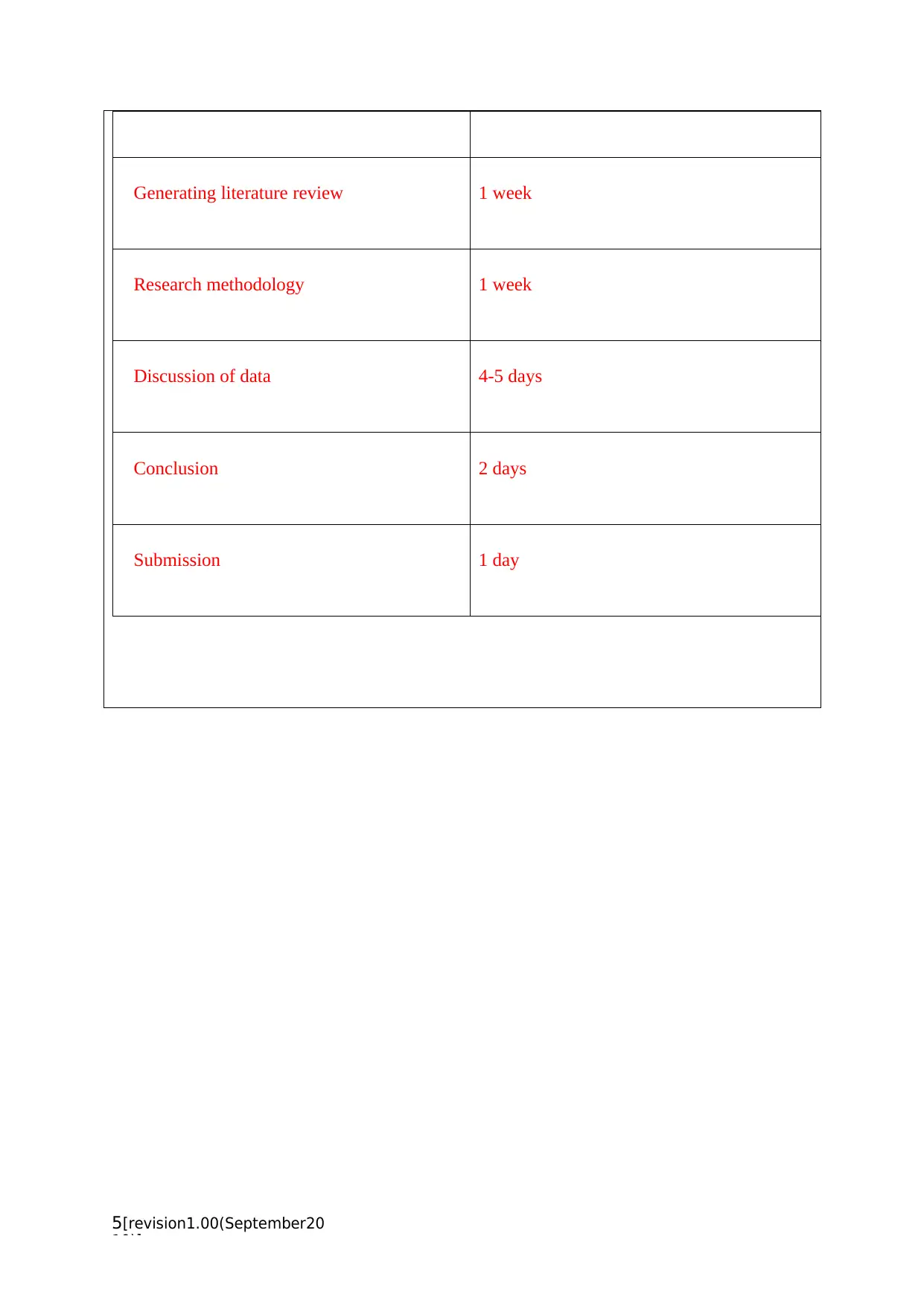
5 [revision1.00(September20
10)]
Generating literature review 1 week
Research methodology 1 week
Discussion of data 4-5 days
Conclusion 2 days
Submission 1 day
10)]
Generating literature review 1 week
Research methodology 1 week
Discussion of data 4-5 days
Conclusion 2 days
Submission 1 day
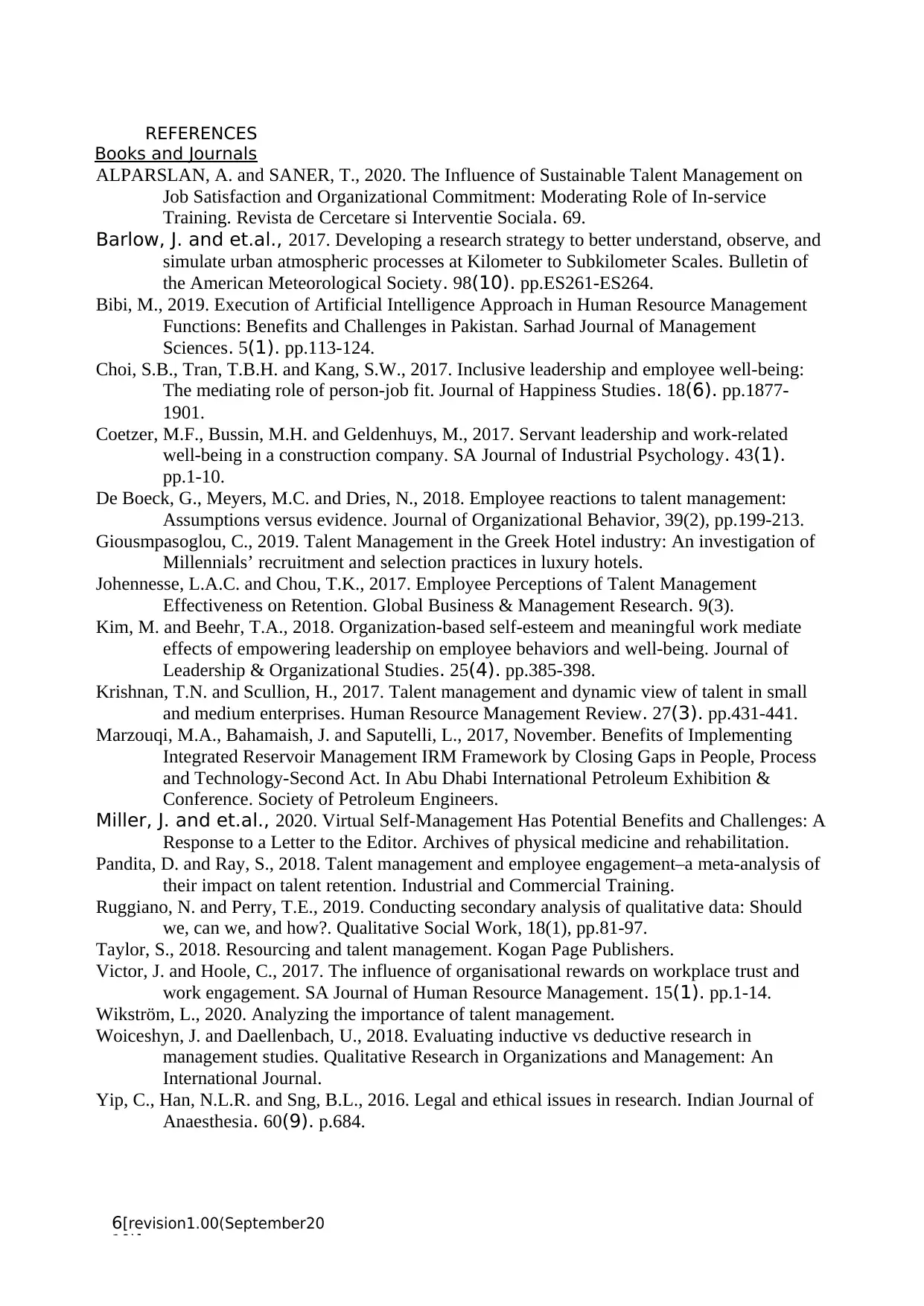
6 [revision1.00(September20
10)]
REFERENCES
Books and Journals
ALPARSLAN, A. and SANER, T., 2020. The Influence of Sustainable Talent Management on
Job Satisfaction and Organizational Commitment: Moderating Role of In-service
Training. Revista de Cercetare si Interventie Sociala. 69.
Barlow, J. and et.al., 2017. Developing a research strategy to better understand, observe, and
simulate urban atmospheric processes at Kilometer to Subkilometer Scales. Bulletin of
the American Meteorological Society. 98(10). pp.ES261-ES264.
Bibi, M., 2019. Execution of Artificial Intelligence Approach in Human Resource Management
Functions: Benefits and Challenges in Pakistan. Sarhad Journal of Management
Sciences. 5(1). pp.113-124.
Choi, S.B., Tran, T.B.H. and Kang, S.W., 2017. Inclusive leadership and employee well-being:
The mediating role of person-job fit. Journal of Happiness Studies. 18(6). pp.1877-
1901.
Coetzer, M.F., Bussin, M.H. and Geldenhuys, M., 2017. Servant leadership and work-related
well-being in a construction company. SA Journal of Industrial Psychology. 43(1).
pp.1-10.
De Boeck, G., Meyers, M.C. and Dries, N., 2018. Employee reactions to talent management:
Assumptions versus evidence. Journal of Organizational Behavior, 39(2), pp.199-213.
Giousmpasoglou, C., 2019. Talent Management in the Greek Hotel industry: An investigation of
Millennials’ recruitment and selection practices in luxury hotels.
Johennesse, L.A.C. and Chou, T.K., 2017. Employee Perceptions of Talent Management
Effectiveness on Retention. Global Business & Management Research. 9(3).
Kim, M. and Beehr, T.A., 2018. Organization-based self-esteem and meaningful work mediate
effects of empowering leadership on employee behaviors and well-being. Journal of
Leadership & Organizational Studies. 25(4). pp.385-398.
Krishnan, T.N. and Scullion, H., 2017. Talent management and dynamic view of talent in small
and medium enterprises. Human Resource Management Review. 27(3). pp.431-441.
Marzouqi, M.A., Bahamaish, J. and Saputelli, L., 2017, November. Benefits of Implementing
Integrated Reservoir Management IRM Framework by Closing Gaps in People, Process
and Technology-Second Act. In Abu Dhabi International Petroleum Exhibition &
Conference. Society of Petroleum Engineers.
Miller, J. and et.al., 2020. Virtual Self-Management Has Potential Benefits and Challenges: A
Response to a Letter to the Editor. Archives of physical medicine and rehabilitation.
Pandita, D. and Ray, S., 2018. Talent management and employee engagement–a meta-analysis of
their impact on talent retention. Industrial and Commercial Training.
Ruggiano, N. and Perry, T.E., 2019. Conducting secondary analysis of qualitative data: Should
we, can we, and how?. Qualitative Social Work, 18(1), pp.81-97.
Taylor, S., 2018. Resourcing and talent management. Kogan Page Publishers.
Victor, J. and Hoole, C., 2017. The influence of organisational rewards on workplace trust and
work engagement. SA Journal of Human Resource Management. 15(1). pp.1-14.
Wikström, L., 2020. Analyzing the importance of talent management.
Woiceshyn, J. and Daellenbach, U., 2018. Evaluating inductive vs deductive research in
management studies. Qualitative Research in Organizations and Management: An
International Journal.
Yip, C., Han, N.L.R. and Sng, B.L., 2016. Legal and ethical issues in research. Indian Journal of
Anaesthesia. 60(9). p.684.
10)]
REFERENCES
Books and Journals
ALPARSLAN, A. and SANER, T., 2020. The Influence of Sustainable Talent Management on
Job Satisfaction and Organizational Commitment: Moderating Role of In-service
Training. Revista de Cercetare si Interventie Sociala. 69.
Barlow, J. and et.al., 2017. Developing a research strategy to better understand, observe, and
simulate urban atmospheric processes at Kilometer to Subkilometer Scales. Bulletin of
the American Meteorological Society. 98(10). pp.ES261-ES264.
Bibi, M., 2019. Execution of Artificial Intelligence Approach in Human Resource Management
Functions: Benefits and Challenges in Pakistan. Sarhad Journal of Management
Sciences. 5(1). pp.113-124.
Choi, S.B., Tran, T.B.H. and Kang, S.W., 2017. Inclusive leadership and employee well-being:
The mediating role of person-job fit. Journal of Happiness Studies. 18(6). pp.1877-
1901.
Coetzer, M.F., Bussin, M.H. and Geldenhuys, M., 2017. Servant leadership and work-related
well-being in a construction company. SA Journal of Industrial Psychology. 43(1).
pp.1-10.
De Boeck, G., Meyers, M.C. and Dries, N., 2018. Employee reactions to talent management:
Assumptions versus evidence. Journal of Organizational Behavior, 39(2), pp.199-213.
Giousmpasoglou, C., 2019. Talent Management in the Greek Hotel industry: An investigation of
Millennials’ recruitment and selection practices in luxury hotels.
Johennesse, L.A.C. and Chou, T.K., 2017. Employee Perceptions of Talent Management
Effectiveness on Retention. Global Business & Management Research. 9(3).
Kim, M. and Beehr, T.A., 2018. Organization-based self-esteem and meaningful work mediate
effects of empowering leadership on employee behaviors and well-being. Journal of
Leadership & Organizational Studies. 25(4). pp.385-398.
Krishnan, T.N. and Scullion, H., 2017. Talent management and dynamic view of talent in small
and medium enterprises. Human Resource Management Review. 27(3). pp.431-441.
Marzouqi, M.A., Bahamaish, J. and Saputelli, L., 2017, November. Benefits of Implementing
Integrated Reservoir Management IRM Framework by Closing Gaps in People, Process
and Technology-Second Act. In Abu Dhabi International Petroleum Exhibition &
Conference. Society of Petroleum Engineers.
Miller, J. and et.al., 2020. Virtual Self-Management Has Potential Benefits and Challenges: A
Response to a Letter to the Editor. Archives of physical medicine and rehabilitation.
Pandita, D. and Ray, S., 2018. Talent management and employee engagement–a meta-analysis of
their impact on talent retention. Industrial and Commercial Training.
Ruggiano, N. and Perry, T.E., 2019. Conducting secondary analysis of qualitative data: Should
we, can we, and how?. Qualitative Social Work, 18(1), pp.81-97.
Taylor, S., 2018. Resourcing and talent management. Kogan Page Publishers.
Victor, J. and Hoole, C., 2017. The influence of organisational rewards on workplace trust and
work engagement. SA Journal of Human Resource Management. 15(1). pp.1-14.
Wikström, L., 2020. Analyzing the importance of talent management.
Woiceshyn, J. and Daellenbach, U., 2018. Evaluating inductive vs deductive research in
management studies. Qualitative Research in Organizations and Management: An
International Journal.
Yip, C., Han, N.L.R. and Sng, B.L., 2016. Legal and ethical issues in research. Indian Journal of
Anaesthesia. 60(9). p.684.
⊘ This is a preview!⊘
Do you want full access?
Subscribe today to unlock all pages.

Trusted by 1+ million students worldwide
1 out of 6
Related Documents
Your All-in-One AI-Powered Toolkit for Academic Success.
+13062052269
info@desklib.com
Available 24*7 on WhatsApp / Email
![[object Object]](/_next/static/media/star-bottom.7253800d.svg)
Unlock your academic potential
Copyright © 2020–2026 A2Z Services. All Rights Reserved. Developed and managed by ZUCOL.




